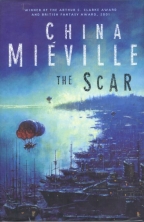 |
 |
|
China Mieville calls out for fantasy that is inventive at his website. Trouble is, there's already a bit of it about! |
Plan on hearing too much about China Mieville as this novel is released in the US to enthusiastic reviews. |
|
|
|
Actually Weird Fantasy:
Jeffrey Ford, Steve Cockayne and Jerry Jay Carroll
The Agony Column for May 16, 2002
Commentary by Rick Kleffel
When I was in high school and reading boatloads of primal fantasy fiction -- 'The Lord of the Rings', 'Gormenghast', Robert E. Howard and 'The Eternal Champion' -- I was often accused by my parents of living in a fantasy world. These days, I could probably be accused of occasionally living in the Real World®. After my initial explorations into fantasy, I pretty much abandoned the genre, and let it run wild with swords, swords and leather diapers. Recently however, I've found myself reading more and more fantasy. This is a cause for concern. Most of my interest in genre fiction has been focused on horror and to a slightly lesser extent, on science fiction. In keeping with the pop songs of yesteryear, the times are changing and fantasy is coming out of a long doldrums. Yes, there is ever and anon a wash of GCFT material. But there are also a few writers really trying to use the flexibility available within the genre of fantasy to write something rather different and really entertaining.
 |
 |
|
China Mieville calls out for fantasy that is inventive at his website. Trouble is, there's already a bit of it about! |
Plan on hearing too much about China Mieville as this novel is released in the US to enthusiastic reviews. |
Currently the 800-pound gorilla of fantasy is the talented China Mieville. His three novels, 'King Rat', 'Perdido Street Station' and 'The Scar' have dynamited reader's expectations about what can and cannot be done. But he's not alone in this regard. There are other writers out there doing wonderful work, and they're not that hard to find. Most of these writers have something in common. Their fantasy is much more urban and technological than the purely supernatural work of earlier fantasists. Let me explain.
In the work of Tolkien, Howard and Moorcock, for example, the source of "magical" power is essentially the work of various active and intervening gods. Like it or not, there's a certain religious overtone to their work. Somewhere along the line, you've got to buy into a belief system that says disembodied old men -- or women -- meddle with the lives of mortals by giving certain folks, usually sorcerers but often warriors or kings a power that is essentially supernatural. Yes, sometimes the magic is categorized and explained in a systematic fashion, but at the back end, it's powered by a god.
Furthermore, the settings in these books tend to be sharply divided between huge cities built on the scale of ancient Rome and wandering wastelands through which the characters usually march. There are none of the subtleties of today's geography, no real gradations from suburb to city to mega-city to parks to untouched natural landscapes. And there's no real thought of technology in these books either. If addressed, it's a very small part of the picture -- perhaps the magic is neatly divided, or a gun or explosive makes an appearance. But the pervasive effect of technology on any civilization is clearly not of concern.
What are of concern are the heroic and epic qualities of scale and seriousness. These fantasies all share a feeling importance. It's a given that what is to pass in the typical fantasy is something that will change the entire world, usually from something of a slave state into something more closely resembling the representative republic -- or benign dictatorship that we currently reside under. Jokes are few and far between. Humor is scarce.
But some new writers are bringing a smile back into the non-world and toaster or coffee maker as well. Jerry Jay Carroll, author of 'Top Dog' and 'Dog Eat Dog' cleaves closest to classical fantasy, but sets a significant part of his story in present day reality, and adds a skewed sense of humor to the proceedings. Jeffrey Ford, whose novels about The Well-Built City and its environs include 'The Physiognomy', 'Memoranda' and 'The Beyond' has created a very peculiar and original world in which technology plays a significant role. And finally, the latest fantasy writer to enter the untraditional tradition is Steve Cockayne, whose 'Wanderers and Islanders' includes a wonderful treatise on technological obsolescence. Does this sound like the old elves and sorcerers crap to you?
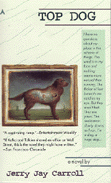 |
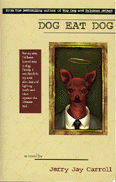 |
|
This novel is not the namby-pamby crapola youmight take it to be on looking at the cover. It's really a great bracing read with lots of savage wit. |
This novel is well-suited for the horror-reading crowd who want something different. |
Back in late 1996 and early 1997 a couple of new authors appeared on the scene whose works showed they were serious about taking the self-seriousness out of fantasy. First up, according to the publication details was Jerry Jay Carroll's 'Top Dog'. Now I remember that when I first saw this novel I pretty much thought 'Yuck!'. Time passed. I read 'Inhuman Beings', which despite being a re-make of the first re-make of the movie 'Invasion of the Body Snatchers' was actually very well written. Who needs a new idea when you're that good a writer?
So when the sequel to 'Top Dog', 'Dog Eat Dog' came out, I did the right thing, bought 'Top Dog' and actually read it, having already judged it and found it wanting. You know what? Turns out it was me who was wanting a chance to go back in time and read the first book when it first came out.
'Top Dog' has a pretty simple premise -- Corporate Raider William B. Ingersoll finds himself incarnated as a dog in a world bearing a distinct resemblance to those created Tolkien and his innumerable successors. We've seen it a hundred times in various forms. But as with 'Inhuman Beings', Carroll distinguishes his fantasy with a very droll and modern sensibility. Ingersoll was never a "good guy" in the world we live in, and he's not inclined to join them in this new world he finds himself trapped in. He wants to check out his options. And as he does, Carroll skewers the usual leather diaper fight-festival as savagely as a dot-com brat might rank on a WWF smackdown. The tension comes not from wondering whether Our Hero and His Ragged Team of Good will triumph over Evil, but rather from wondering if Our Hero will join the Good or Evil team. It's a simple moral quandary that's cleverly skewed and filled with a very urban sensibility. Yes, you got you sorcerers and swordsmen -- but they're up against a stockbroker. In a contest between the evil of a swordsman, a sorcerer and a stockbroker, who has the upper hand? If you're in the diapers, be afraid.
The follow-up to this novel, 'Dog Eat Dog', reverses the neutron flow. It takes place in this world, for the most part, and offers Ingersoll the opportunity to fight the forces of fantasy in a purely urban setting. Though Ingersoll's morality may have changed, his methods haven't, and his undoing of the Big Bad in 'Dog Eat Dog' is purely political and nothing short of ingenious. It's certainly relevant to recent electoral events in the Untied States. Because it takes place largely in this world, and involves a bit of the supernatural, 'Dog Eat Dog' has more the feel of horror than of fantasy. But what really drives all of Carroll's novels are his witty and trenchant observations about all things 20th century and urban. This is certainly not the typical of the Leather Diaper domain. Carroll's fantasies has very urban feel about them, even if they're traipsing about in trackless primeval forests looking for swordsmen. "The public loved to hate me. The poll numbers showed I had topped many historical figures in the most-loathed category. 'A lot of people don't remember Pol Pot,' Maye explained when I left Mr. Pot behind. I guess he didn't want me to get a swelled head."
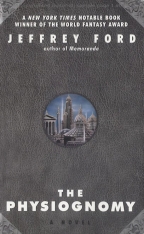 |
|
Like no other fantasy you've recently read, 'The Physiognomy' creates a city of the mind. It owes mroe to Borges and Kafka than to Tolkien. |
I must also admit that I passed on the first instance of Jeffrey Ford's work, 'The Physiognomy'. Saw it, though it looked interesting, but never got round to it. When the sequel 'Memoranda' arrived, I finally paid it the attention it deserved. I bought 'The Beyond' in hardcover. Thinking backward 101. I've got that hindsight issue covered. 'The Physiognomy' is very unlike most fantasies. It starts out in a metropolis that's neither fantasy nor SF, but something entirely different from wither. Cley is the master of the title's occupation, reading characters in the contours of people's faces. Rather like judging a book by its cover, no? In the land of the Well-Built City, Cley is at the top of the food chain -- for a while. A carefully orchestrated downfall awaits him, and the revelations to follow have more in common with Kafka and Borges than they do with Tolkien.
As does Carroll, Ford's prose has a rather brusque and witty style. He includes lots of urban features to his narrative -- drug addiction, for example. Cley is addicted to something called Sheer Beauty, and without it he gets very cranky. Of course since he starts on the cranky side of the spectrum, things get even more entertaining when he goes without. In 'Memoranda' and 'The Beyond', Ford completes the compulsory trilogy format, though the books function independently. That is, they don't leave you hanging wondering what the heck is going to happen, but reading the first is a prerequisite for reading the second, and reading the second a prerequisite for reading the third.
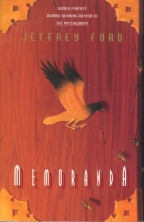 |
|
'Memoranda' will thrill seekers of horror, science fiction and witty prose. Ford is remarkably inventive and writes short, readable novels. |
In 'Memoranda' the second novel, Cley has reformed himself somewhat, along the lines of Ingersoll in 'Dog Eat Dog'. Living in the idyllic aftermath of the first novel, Cley is the first called to the defense when a sleeping disease sweeps through his utopia. The journey for a cure will take him into a landscape of the mind and the soul. Ford populates his imaginary with some rather loathsome monsters and his inventive touches spring from Borges' libraries of the mind. As with Carrroll, the real draw here is Ford's prose. It's very witty and urbane, funny at times but capable of being thought-provoking. He also does some very nice character work in Misrix, a demon who is trying to cope in the human world.
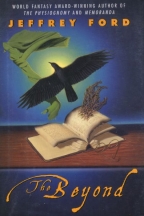 |
|
'The Beyond' is a tale told by Misrix the demon. There are lots of levels and references here to works as diverse as King and Kafka. |
Misrix takes the center stage in 'The Beyond', Ford's last novel set in the world of Drachton Below's Well-Built City. But most of this novel, narrated by Misrix takes place in the Beyond, as Cley is forced to face his past and demons both real and self-created. As with the other novels, it's the words that save the day, not the sword. Ford's prose is sparse, his story moves quickly and economically. Oddly enough, to my mind horror fans would be more likely to enjoy this novel than the typical GCFT fan. The surreal and meta-fictional aspects of the story, and the story within the story take the novel to a place that is more familiar to readers of Stephen King than J. R. R. Tolkien.
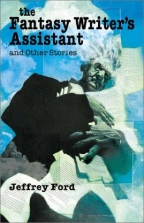 |
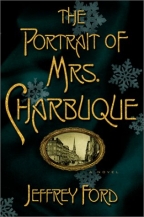 |
|
This year will see the release of two book by Jeffrey Ford. We'll see a collectin of short stories titled 'The Fantasy Writer's Assistant'. |
'The Portrait of Mrs. Charbuque' looks to expand Ford's audience. |
But wait --there's more! Well, not really. Let me explain. This summer and fall we can look forward to two new works by Jeffrey Ford. 'The Fantasy Writer's Assistant' is apparently a collection of short stories, which promises to cover wider ground than his work in the Well-Built City. But even better, a new novel is coming out in June, 'The Portrait of Mrs. Charbuque' may be Ford's big breakout, if his previous novels weren't enough. This looks to be a very steampunk-style novel set in 1893 New York, about an artist commissioned to paint a portrait of a woman he not allowed to look at. I look forward to adding it to my summer reading. I'm envisioning the beach.
 |
|
'Wanderers and Islanders' by Steve Cockayne is a wonderfully thoughtful fantasy that explores the themes of science fiction quite effectively in a fantasy-style world. It also gets in a bit of metafictional surrealism. |
But Carroll and Ford are not the only writers working on this sort of 'blue collar' fantasy. A British writer, Steve Cockayne has his first novel out, 'Wanderers and Islanders'. As with all the other books here, 'Wanderers and Islanders' has a more matter of fact tone and seems more grounded than the GCFT clones. It bills itself as 'Legends of the Land Book One', but does not build up to a cliff-hanging denouement. Instead, it works steadily and treads lightly, as the stories of an unemployed magician, a young man coming of age and an old man asked to refurbish a mysterious mansion all intertwine in a rather crafty and entertaining fashion. Yes, there's more than a bit of meta-fictional work going on here as well. Cockayne has also co-opted the subjects of science fiction, particularly technology and nicely extrapolated in a very science-fictional fashion without seeming the least bit like a science fiction writer. A fantasy involving magicians is not the place you expect to get a thought-provoking speculation on obsolescence and unemployment, but here it is. Cockayne also does something that seems almost impossible. He creates a very compelling mystery at the core of this novel, then solves the mystery without destroying the sense of wonder. And best of all, it's all done in a low-key manner, without the least bit of pretension. Here's a novel I found on the first round, and you deserve to find it on the first round as well.
So fantasy isn't just the crap-heap I think it is. Or at least not as a whole. Yes, you can go through your GCFT till they are what -- 10? 15 books long? And there's no denying that there's a comfort in the complete predictability and long-winded exposition, at least for a huge part of the book buying audience. But out there as well are fantasies that actually fantasize rather than regurgitate, where words trump the sword.
Thanks,
Rick Kleffel